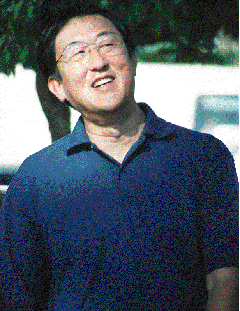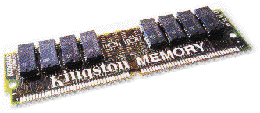|
GOLDSEA |
ASIAN AMERICAN RAGS-TO-RICHES SAGAS
MIDAS OF MEMORY
PAGE 1 OF 6
 he man who came down to the lobby to greet us was well over six-feet
and stooped a bit as though not wanting to impose by his height.
He was dressed in a blue polo shirt and jeans. His face wore a gentle,
kindly expression. No doubt he was an assistant to the big man
himself. We were impressed by his unassuming friendliness.
He certainly wasn't the abrupt and haughty palace guard so common in the
corporate world. The hand he extended was as warm and gentle as the expression on his unlined face.
he man who came down to the lobby to greet us was well over six-feet
and stooped a bit as though not wanting to impose by his height.
He was dressed in a blue polo shirt and jeans. His face wore a gentle,
kindly expression. No doubt he was an assistant to the big man
himself. We were impressed by his unassuming friendliness.
He certainly wasn't the abrupt and haughty palace guard so common in the
corporate world. The hand he extended was as warm and gentle as the expression on his unlined face.
"Hi, I'm John," he said in a soft, almost hesitant voice, as though not wanting to presume with that bit of information.
"John Tu?" we asked. We refrained from adding, The dynamo who, with his
partner David Sun, founded Kingston Technologies and turned it into a
multi-billion-dollar company, the world's leading independent supplier of
memory modules? The same John Tu who in eight short years has taken on the stature of an Asian American business legend?
The man nodded with a vaguely apologetic expression as though concerned
that he might have disappointed us.
We rode the elevator to the second-floor and walked past a large formation
of standard-issue prefab cubicles. John Tu exchanged greetings with
employees, most of whom were better dressed than him. By the time we
were seated in the conference room, we had recovered enough from our
surprise to remark on the obvious lack of distance between him and his
employees.
"Life is not 'Excuse me, Mr Tu, may I have five minutes of your time?'" he said.
We were even more surprised, a while later, when we discovered that he
didn't have his own private office and worked in one of the dozens of
cubicles filling the floor. At his level of success, about the only thing that could trip
him up was arrogance, and we could see that Tu was well fortified
against that danger. He was the proverbial stalk of ripe grain.
[CONTINUED BELOW]
We began to understand how Kingston
had become so big so fast--and more importantly--why it was expected to
reach $2.5 billion in sales during the coming year. Tu was the kind of boss
people didn't want to disappoint, and in a fast-growing company, retaining
good, hard-working employees was a critical factor in growth. Kingston
had the industry's highest employee-retention rate. As it
turned out, its employees were smart to put their faith in Tu. Later that
year, when a controlling interest in Kingston was bought by Masayoshi Son,
the Korean-Japanese boy wonder who had also bought Ziff-Davis and
Comdex, Tu remembered who had helped him achieve that
two-billion-dollar payday. To provie it, he gave away several hundred
million dollars to employees in the form of a generous bonus. The smallest bonus was reputedly $75,000. The biggest? In the millions.
PAGE 2
PAGE 1 |
2 |
3 |
4 |
5 |
6 |
|
|
|
|



John Tu and his partner began Kingston by combining obsolete memory chips into modules that could meet the booming demand in the personal computer market.
|
<
|
"Life is not 'Excuse me, Mr Tu, may I have five minutes of your time?'"
|
CONTACT US
|
ADVERTISING INFO
© 1996-2013 Asian Media Group Inc
No part of the contents of this site may be reproduced without prior written permission.
|

 he man who came down to the lobby to greet us was well over six-feet
and stooped a bit as though not wanting to impose by his height.
He was dressed in a blue polo shirt and jeans. His face wore a gentle,
kindly expression. No doubt he was an assistant to the big man
himself. We were impressed by his unassuming friendliness.
He certainly wasn't the abrupt and haughty palace guard so common in the
corporate world. The hand he extended was as warm and gentle as the expression on his unlined face.
he man who came down to the lobby to greet us was well over six-feet
and stooped a bit as though not wanting to impose by his height.
He was dressed in a blue polo shirt and jeans. His face wore a gentle,
kindly expression. No doubt he was an assistant to the big man
himself. We were impressed by his unassuming friendliness.
He certainly wasn't the abrupt and haughty palace guard so common in the
corporate world. The hand he extended was as warm and gentle as the expression on his unlined face.







